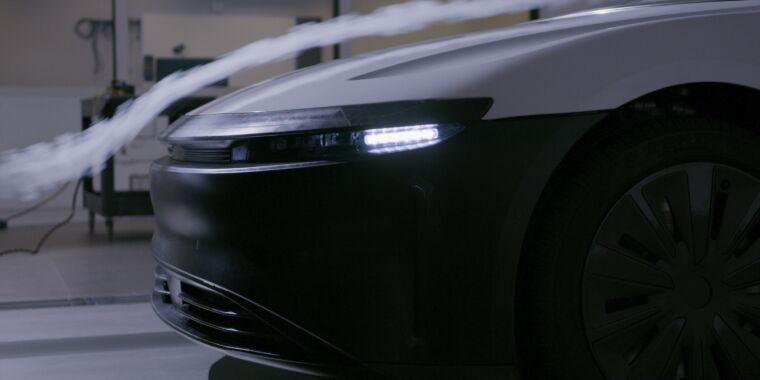
-
A prototype Lucid Air undergoing a flow visualization test at the Windshear wind tunnel facility in Concord, North Carolina.Lucid Motors
-
Side intakes in the front fascia smooth airflow around the wheel wells, which are a source of a lot of turbulence. There is also a vortex-generating air intake under the front bumper, but you can’t see that in this image.Lucid Motors
-
You can see here the airflow remains attached to the surface of the Air’s roof and doesn’t spiral up into a huge turbulent wake at the rear.Lucid Motors
A few weeks ago, we took a look at the most aerodynamically efficient vehicles ever made. At the time, the lowest-drag production car for sale in the US was the Porsche Taycan, which cuts through the air with a drag coefficient (Cd) of 0.22. But the rather excellent electric Porsche won’t wear that crown for very long. Lucid Motors is readying production of its first battery electric vehicle, the Air, and it has just released the results of some wind tunnel testing. Tests at the Windshear facility in North Carolina have determined that the Air has a Cd of only 0.21.
Moving through the air as easily as possible is important if you want to travel the farthest distance using a given amount of energy. As such, optimizing a car for low drag has become more important, first as regulators in Europe demanded more efficient cars, then more recently as range has become the most important attribute of a battery electric vehicle.
“Aerodynamic efficiency plays a key role in achieving world-beating range and performance and is particularly valuable to an EV in that it provides ‘smart range’ independent of battery pack size. So naturally we intensively focused upon aerodynamics throughout the Lucid Air’s development. Our aero team worked seamlessly with design and engineering counterparts, establishing aero efficiency as a core tenet of Lucid Air from its very inception, enabling us to achieve this new standard,” said Peter Rawlinson, CEO and CTO of Lucid Motors.
Cutting drag was also a main concern for race car designers, back before they discovered that other aerodynamic property called downforce. Ultra-low drag streamliners were most common at Le Mans, where a three-mile (4.8km) straight allowed for some extremely high top speeds. Similarly, the Lucid Air’s top speed benefits from its low drag; one of the alpha prototypes has already bettered 235mph (378km/h) in testing, and Rawlinson told me recently that he’s sure the car has more to show, although production cars will have an artificially limited Vmax to meet the safety rating of their tires.
Lucid says its beta prototypes are regularly achieving over 400 miles (643km) of highway range in testing, and a real-world range of 400 miles is the company’s target for the Air, which goes into production later this year. Currently, the only BEV with such long legs is the Tesla Model S, which recently broke through that psychological barrier thanks to a process of incremental improvement over the past eight years.
However, when the production Air is revealed to the world in September, it won’t be the lowest-drag production car ever. That honor is held by a pair of streamliners that could only briefly be found in showrooms: the General Motors EV1 and the Volkswagen XL1.
Listing image by Lucid Motors
https://arstechnica.com/?p=1688266

